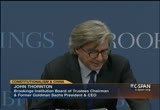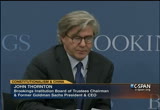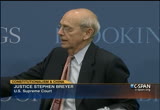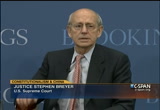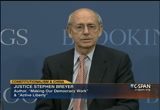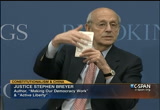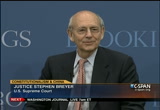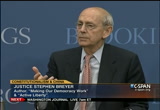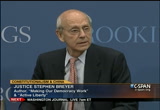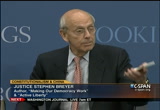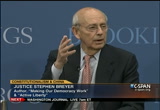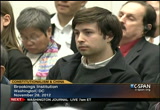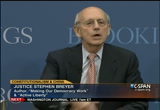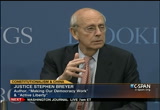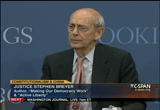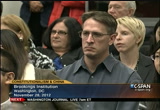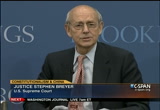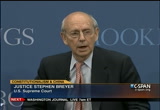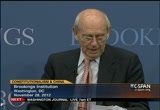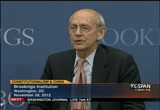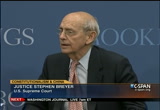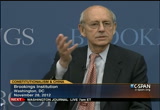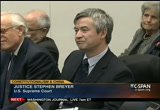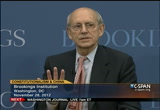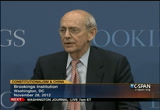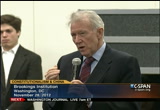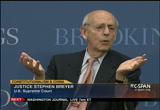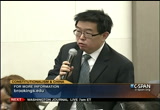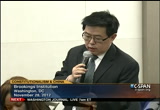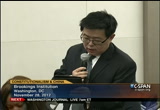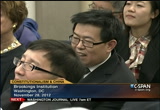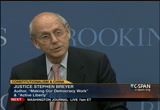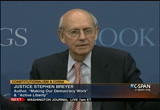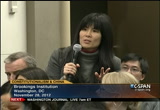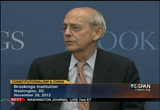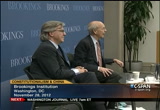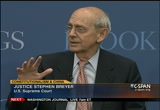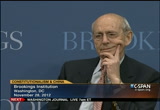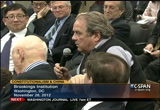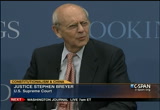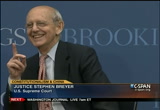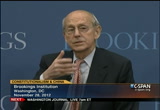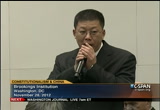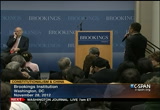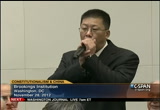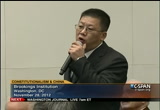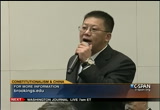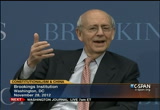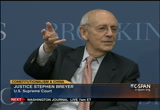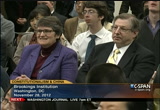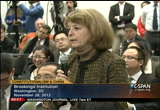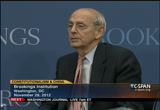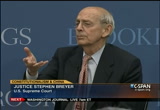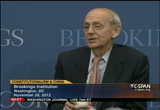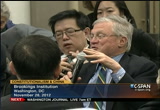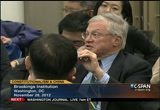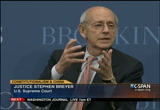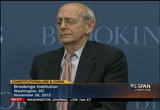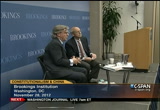tv Capitol Hill Hearings CSPAN December 28, 2012 6:00am-7:00am EST
6:00 am
might have been lost on the editor. so, it has thrilled me know wind that someone as imminent as justice breyer has become increasingly engaged on this topic. when we were talking earlier, he talked about during the conversation. and i said, "trust me, i am going to drag you into this thing every step of the way." if you ever lose your day job, you could be a permanent diplomat. we are very pleased to have him here today. where i would like to start is, i would like you to talk a little bit about your book and its relevance to the chinese situation, some sense of how all that was received? >> i knew how it was received. my relation to china -- i went
6:01 am
with a professor who went to china. the press said -- what are you doing? >> i said i am writing a book. "china, yesterday, today, and tomorrow." but i did go over there. [laughter] there are about 600 of them and they speak english. it is like talking to a group in texas. there is no problem in understanding how the system works. exactly what they said. how do we get from here to there? to which my response is, i do not know. that is a problem for you to solve, i cannot do it. what is it that they seem to be interested in?
6:02 am
it is so obvious. do you think this rule of law has been given on day one and suddenly it was followed? of course not. do not think democracy will solve them. it is both your friend and your enemies. hamilton and madison right the document. it is a very good document. ask any of us on the courts, we would be in agreement on the basic things. the basic framework is it creates institutions of democracy. people can decide for themselves what kinds of community they want it is a special kind of democracy.
6:03 am
it is a democracy that protect certain basic human rights that assures some degree of equality. the separation of powers is not what you are looking for here. separation of powers -- he is very clear. you are looking for judicial independence. the separation of powers is both vertical and it is also horizontal. the basic function is not to preserve a rule of law. it is to divide power into pockets. you prevent any group of people from being too powerful. that is the basic purpose. finally, a rule of law. you have a document that is trying to restore democratic
6:04 am
institutions, protection of human rights, a degree of equality, separating power, and guaranteeing a rule of law. hamilton is the one who brings in the court. he is trying to answer a question. we have written a beautiful document. read federalist 78. we have created a beautiful document. if nobody follows the rules, these are the ground rules, and if no one is to say when somebody in the government strays outside the boundaries, we should hang it up in a museum. nonetheless, you get the point. somebody has to have the power to say when the others have
6:05 am
gone too far. who should that be? the president is already too powerful. congress? wait a minute, they are experts in popularity. believe me, they know popularity. if they did not, they would not be where they are. this document gives the same rights and protections exactly to the least popular person in the united states as to the most popular. you're not going to get them to do it. that leaves the judges. if you read 78, it is not that he thought the judges were wonderful. he thought that was the best choice available. we will give them the power. who are they? we do not know. perfect. wonderful. they are egomaniacs yet.
6:06 am
-- they are not egomaniacs yet. they did not have the power of the purse and i do not have the power of the sword. wonderful. we give them to the power to declare what others are doing are contrary to the constitution. it then takes a long time, close to 200 years, before that power becomes effective. the thing is to study the history of slavery and segregation. why? it's so tempting to say, the united states is the child of the french enlightenment. read what he writes. it is in many respects but not in light of slavery. he comes over here to study what democracy will be like in the future.
6:07 am
i will tell you two things that will happen. big problems in the united states. the first is the indian. that will not be such a terrible problem because they will kill them all. the second is slavery. remember that there were large sections of the country or the natural state of things was not human rights. the natural state of things was slavery. and then racial segregation. that took a very long time and a civil war and 80 years of segregation before we began to deal with that problem. to me, you go back and let it one of these cases. look at the history of the cherokee indian case. the supreme court says the law says the northern georgia belongs to the cherokee indian tribe.
6:08 am
the president of the united states says the supreme court made this decision, now let them enforce it. go forward. andrew jackson sends troops. they go down to oklahoma on the trail of tears. the efforts that were made to desegregate after -- when holmes was on the courts, contrary to what the 15th amendment says. when they keep a black person from the polls. we cannot strike this down because nobody will do what we said. we are not unfamiliar with this kind of problem. what i usually say, because i believe it so much, i think a great day in the history of the law of the united states in
6:09 am
respect to establishing a rule of law was the day when the nine black children in little rock were finally -- you have the case which arises out of little rock. little rock begins when a judge says, we mean it. the first year, what happened? nothing. the second year? nothing. the third year, they finally get around to doing something. put those nine children in the school. the governor of arkansas called in his militia. the congressmen down there, who was a moderate, they arrange a meeting with eisenhower. president eisenhower meets with the governor.
6:10 am
the governor says, i will let him do it. i will integrate the school. the governor goes out of the room and tells the press the opposite. the president dressed me down like a general dresses down a sergeant. that is what happened. eisenhower has to say, what am i going to do? eisenhower says to the governor of south carolina, what do i do? the governor was a moderate and had resigned from the supreme court. if you send in troops into arkansas, you'll have to reoccupy the south. public opinion for human-rights was exactly the opposite. the attorney general says to eisenhower, you have to send in troops. and he did. he took paratroopers from the 131st airborne.
6:11 am
-- the 101st airborne . it has to be popular. he took those thousand troops deliberately chosen because they were the heroes of world war ii. every american knew that at the time. they put them on the airplanes and may take those children and that picture went around the world. fabulous. the supreme court said, absolutely, you do this. the day after the supreme court said that, the governor closed the schools. they remained close for about eight months. that was the beginning of freedom riders into the south. martin luther king andit was a whole movement. why am i telling you this? i did not see how you bring about the rule of law without making the rule of law popular. the people have to understand the virtue of its and that is
6:12 am
tough because what it means is you will have institutions called the courts, which by definition are there to do things when they are unpopular. wow. wow. how do we bring about that kind of society? you have bush v. gore, the most remarkable thing about that case, people followed it. and it was very popular and very wrong. no guns, no riots. i know what half of you were thinking. as university students. they are thinking to bed there
6:13 am
weren't some riots. before you think that, you could turn on your television set and see what happens in countries that solve their problems that way. what i see every day in the court room is people who have somehow -- i do not know how -- partly education. i have read in this book, -- partly they think it is normal. justice kennedy goes over to china lot. -- goes over to china in a lot. what would you say? we wrote down eight or nine. ultimately, what you're working towards is a general understanding. i found my own way of expressing that. of what that understanding has to be. maybe you can get there.
6:14 am
when i saw the apartheid in south africa, it meant something to me. i looked at the television and on the television, there is a woman, well dressed, well- educated woman, well spoken. she is black. she says the following. country? our situation is not normal. how did you get people to think that is normal to follow a rule of law and follow the judges even when the judges decide something you think is wrong and even when it is unpopular? the problem is put to me by
6:15 am
those students at the university. you have to have an independent judiciary. how do you do that? tell them they cannot be fired. they will love that. and then you tell them we will not cut your pay. which we don't live up to here, by the way. they will like that, too. i heard the russian judges speak about it thereafter. simple things. i did not know how you'd get them out of this -- as long as you have three people, the
6:16 am
police chief, the prosecutor, and the judge deciding cases -- you could create a situation where the general public thinks that is abnormal. this is sort of weird. how do you bring that about? that is why you have to chapters in your book. the thing i like best about our bar is a lawyer will come in and say to a judge, judge, you are wrong. you are just wrong. they will say it politely. you are wrong. the judge will feel a little sheepish. if he will decide something so obviously wrong. and the press. i know the greatest test of the
6:17 am
independent bar and prospered the press is always criticizing you and the bar is always telling you you are wrong. they are absolutely necessary. the judge and the other country saidwe should do something about the press and the bar. i said, no, that is not the point. [laughter] the point is opposite. you cannot do without this press writing all kinds of things. unless you give the publicity to it, there is no way to build -- all right, so, this is one. this is a dream, but it is the right dream. when democratic people takeover, they want to fire all the judges. everyone you fire, everyone you
6:18 am
fire, you are weakening the independent judiciary link. the good ones think, i could be fired, too. i found south africa very interesting. look and see how they dealt with their judiciaries there. they put in new judges, but they did not fire the old ones. i find it instructive. that was one. the best things in the administrative procedure is a very simple rule. if it is not public, it is not a lot. -- it is not a lot.
6:19 am
-- it is not aok? - a law. simple. when the judge is going to say -- that is a very simple and very important role and it comes under the guise of the administrative procedure. i do not know -- i put them in order of what you try to get first. i do not know. every legal procedure will be conducted in public. wait a minute. deliberating? public. how do you run not? -- how do you run that? there is a rule there called ex parte communication. all the evidence has to be public.
6:20 am
the deliberations can be private. this rule against, nothing goes in to the decision makers mind except to -- it is wonderful that it sounds technical. the more technical it sounds, the better. take the part about commercial law, for example. are you going to get the investments is people feel that their decisions will not be decided fairly? of course, you want businesses. you need a minimum due process.
6:21 am
impartial decisionmaker, an opportunity to present arguments, and an opportunity to sit approves the arguments of the other side. we need those so that the businesses will see that their disputes are being resolved fairly. pretty soon, you have this independent judiciary going. once it is going, you say to the people in the government world, are you worried about being accused of business related crime? if you end up being accused unfairly of that, would you like a fair and impartial tribunal? some of them live like that idea. take an area that is not threatening.
6:22 am
habeus corpus, that should be higher up on the list. king john was asked by his baron -- here is all we want. do not affect a person's liberty negatively. except according tonobody's liberty is affected law. without a law. the law has to be public. i had a case like that. somebody was picked up by the customs authority from dominican republic and put into confinement and threw a rock out the window with a note that
6:23 am
said, send it to my wife. what is your explanation? the explanation has to be according to law. and there we are. people try to do their jobs. a public defender, that is helpful. then you build a core of people with a professional interest in seeing that the process remains. if you think they always succeed here, they do not. plenty of problems with our system. there are plenty. that is actually a virtue. by looking at these problem areas, they can see help people take steps to try to overcome
6:24 am
it. >> i am going to open the floor because we have half an hour to go. who want to ask the first question? in the back -- >> [inaudible] -- washington post -- thank you for those remarks. you have taken us into thorny territory. from your visits to china, your conversations with the students there and officials there, do you have a sense that we are on a path>> thank you. "washington post." thank you for those remarks. territory. from your visits to china, and your conversations with students and officials, if you have a sense that we are on a path where an independent judiciary can be formed in a system that is ruled by communist party that
6:25 am
puts other values much more on you are siding. do you have a sense the party is willing to make the kind of compromises that will put it out of business? >> you are asking the question ii do not know. i do know that you have an entire generation of students who were very much up to speed on this. they do see a rule of law and the kind of values and our constitution as worthwhile and important. how do get from here to there? the battle becomes half won. it is an article of faith with me.
6:26 am
there is no dictatorship. but eventually, public opinion does matter. informed public opinion does matter. no matter what the country, no matter what the situation. that is perhaps an article of faith. i don't see how that is resistible when it is so widespread. >> right here, sir. >> i am from beijing. china economically is doing very well compared to the rest of the world.
6:27 am
6:28 am
6:29 am
it is not just chinese problem. according to people in the economic world. >> you are getting beyond me. i can not see it as a china problem or an american problem. i can see it as a human problem. if you could find a way to have a society without conflicts, that should be what you do. ultimately, law and courts are ways of resolving conflicts among human beings. a good way to do that or people with simple tribes. -- when people were simple tribes of 200 people and they were wandering in the desert,they could solve their problems by having someone -- even then, they had problems.
6:30 am
they would dispense justice individual by individual. and it worked. where you are dealing with groups of people, hundreds of millions of people, there are conflicts you cannot solve except through rules. once you have a system of rules, you have a system of law. as soon as you have a system of law, people say, why should i do that? one kind of answer that seems to work pretty well it is that you had a say in this, you know. maybe it is second-hand, but you had a say. and then they say, the majority is ganging up on me. me. very well, we will have a basic
6:31 am
system that gives even knew certain basic rights. -- even you who are not popular, certain basic rights. how do i know we will do it? we have set up this imperfect system filled with problems. an imperfect system to help make certain you are not being unfairly picked on. unfairly picked on is not something that is an american notion or a chinese notion. justice shall you pursue, not dispense. according to the bible. something somebody dispenses. it is something somebody purses. the idea -- maybe i am wrong. i suspect there are certain things in human nature that are universal. having a say might be wind. -- having a say might be one of them.
6:32 am
not being unfairly picked on is certainly one. that is why i think we are basically here. we're trying to find solutions. whether we are china or wherever we are from. there. >> i work for the national endowment for democracy. my question is -- i am paraphrasing chinese society -- often,the west does not always here as often as some of us like. for them, there are huge legal issues that remain. there isthe number of human rights -- abuses including the
6:33 am
starvation of tens of millions as well as a lot of other political campaigns. to this day, these issues remain off the table. what are the limitations and solutions rule of law can provide for that problem? >> i think people would not vote. to start 30 million people. that is unlikely to occur. courts and judges and constitutions -- people see it as one possible, small guarantee against the kinds of horrors that happened all over the world.
6:34 am
you put nine people together with the system of education and try to make it public and maybe it is a little bit of help. that is where i think we are. the strength as having a notion that i will accept this court decision even though i do not like those judges and i think fit are wrong half the time. i will not even tell you what the lawyers say when they're outside the courtroom. [laughter] it may help a little bit. maybe there is a guarantee of a kind of -- it could be swept away pretty easily. we keep working at it. in china, they just have a
6:35 am
police chief and prosecutor and judge. what kind of a system is that? and then i think, 95% of cases are decided by a plea bargain between the prosecutor and the defense lawyer. and i said, what kind of a system is that? it is not a perfect system. system. there are problems. the important thing for us, i think, is keep working on them. your job is to go participate and take part. if you do not like it, it
6:36 am
convinced the majority to go your way. if you do not like what is going on, there are legal aid societies. go into a courtroom. it is a messy system. it is not terribly efficient. hamilton and the others hoped it would be a kind of guarantee for certain basic liberties. i believe in that or would not spend so much time added. -- or i would not spend so much time at it. yes? >> thank you. i write the mitchell report. as i was listening to the beginning of this conversation, i was reminded of a wonderful conversation that took place probably 30 years ago between
6:37 am
bill moyers and a former justice talking about the constitution. this question goes to what is at the heart of constitutionalism and the rule of law. in the course of that conversation, after a long discussion about constitutionalism, blackman turns to moyers and says it is really the preamble that breathes life into the constitution. i wonder whether that is a point of view that you hold and whether you think it has relevance. >> the preamble -- we, the people of the united states. i used to be able to quote it. i do not think i can now.
6:38 am
[laughter] the preamble is important. we, the people. but it is not the only thing. i had a very interesting conversation in china. i have gone there twice. the first time was a few years ago. it was maybe eight or 10 years ago. i went to beijing and then we went to shanghai. in shanghai, whereas to meet with a group of businessmen. these businessmen had all been involved in dot.coms and had lost a lot of money. most of them had made a lot back. i was fascinated. one of them said, i prefer the cultural revolution. then you knew the government was the enemy. [laughter] now you are not sure. i said, you'll want to bring about a democratic system. it is a very interesting point.
6:39 am
i favor it. i have noticed that there are millions of people in china who make a few dollars a day and they are not a very rich. you have quite a lot of money, i gather. at least i was told. suppose they all say, we are in the majority. you have this money. from you. and give it to us. the one who started it said, are you in favor of that? i am in favor of democracy, but maybe not right now. [laughter] it is like a tiger by the tail. you start looking at the other side and they are afraid of a certain kind of chaos or a certain kind of -- somehow, that is partly -- that fear is
6:40 am
partly, but not completely, dampened by the parts of the constitution that guarantees rights. they cannot just take it away from you. it is a need to find ways of taking the fears of different people. i heard this last night not npr. -- on npr. there were talkingin egypt, they're trying to write a constitution. the liberals walked out. she told the liberals, do not stay out of the room. listen to what people are saying. if you have to make a compromise, you do. but move it along. that is what she said.
6:41 am
6:42 am
the judiciary is not independent. i am a lawyer in china. in order not to split my personality,i will do one year of administrative lawsuit and then another year of commerce law. that is how i can afford to buy a business suit. china is a complicated country. americans can hardly imagine our situation. 24 years agoyears ago, i followed the government's rules. i was mentally kind of ignorant. at that time, my perspectives and my values told me it was correct to support our system.
6:43 am
history told us america's imperialists invaded china. when i heard that part of the story, i was so angry. after i studied law and i entered law school, i learned maybe your system is the best. i don't know whether god has created a better one, i don't know. let me say right now, i am someone who except universal values now. as an individual. a humble man, a humble
6:44 am
individual. however, we know there are 1.3 billion people in china. how many folks can reach this level? it is not that easy. this is my question -- the brookings institution is probably important and knows about chinese law. for those people who still don't understand law and have not accepted universal values, how to make them understand what is law and what is rule of law? why should humans deal with each other in this way?
6:45 am
i learned one phrase in english, how you seek scan from the tiger? they know they cannot be influenced. in my family, when i was fighting with my parents, i could not win because they were my parents. what kind of steps will you allow ordinary people to understand the rule of law? why do we need a rule of law? >> keep doing what you are
6:46 am
doing. keep doing it. i don't have more of an answer to that. sandra o'connor, one of my colleagues, feels very strongly about the fact that teenagers and high-school students are not learning civics. they do not know how the government of the united states works. she spends a lot of for time trying to develop programs on computers, television, that you can send into the classrooms. none of us thinks the rule of law is the american system in its entirety. we think the fact that people will apply and follow a rule of law is one thing that we think -- i think -- and is a national treasure. it is a treasure that has
6:47 am
developed over many, many, many years with many setbacks along the way. in my and mind, there is no way of maintaining it without teaching the next generation, the generation after that. that means teaching. it does not mean propaganda. it means giving them a chance to discuss these things, to understand how the system works, to participate. in san francisco, we would have a day called youth in government day. everybody in the class would get to go shadow one of the board of supervisors. i remember that. like the mayor or the city attorney to find out what his job was like. that was a good thing. one of the reasons -- one of the things i thought in architecture in australia, they
6:48 am
built a parliament. this. the building goes down almost to the ground and it is covered with grass. the children would go to the top and they would roll down to the bottom. i thought that was a good idea. the association in their mind would be this democratic government of australia has a place where i can go roll down the hill. it will have a positive association andit will make them more interested. i am pointing out there is no simple technique. ultimately, it does depend on building support for this idea. it means explaining, debating, discussing. the press shows everybody what is going on.
6:49 am
if there had been people there, i think the report on things, maybe some terrible things that happened and the world on the 20th century would not have happened. >> right here. >> [inaudible] i am an attorney here in d.c. andi have been working on rule of law for many years. in russia and china. the greatest threat to the chinese leadership feels is instability. social disharmony. the chinese people also have experienced a lot of difficult famous, including being jailed
6:50 am
-- difficult things including being jailed legal profession. in our own country, lawyers and people have experienced a lot of pain in the civil rights movement. what would be a way to avoid these calamitous events and bring about the rule of law? >> we will not fire you. they might be willing to do that. if they did that, the judges would love it. nobody else would like it. but maybe they would do it. we have an administrative law rule.
6:51 am
let's have all of the court proceedings on television. the proceedings. not the deliberations. let's not get into that. let's have the trials and all those things. maybe they would do that. what about the arbitration system? for revolving business situations --you are now paying them so much and you are not firing them. why don't we do it according to prepublished rules? there are so many things. you do not have to do everything at once. i saw brook sheer andshe sent us a film from china, which we
6:52 am
looked at. it was a school, fifth graders. the fifth graders had suggested to the government -- they did a film than is absolutely priceless. the parents -- they did not know how to do it. they would make this mistake or that mistake and it would have its comical elements. they got interested. the students got interested. they ended up electing a monitor. i do not know how good the monitor was. there are ways, i think, which you are more likely to think of than i am. taking these ideas and saying, try it out over here and try it out over there. you are building the bar. none of these things -- everything has its drawbacks. you sort of move along. >> the gentleman right here.
6:53 am
>> thank you. i have been involved in studying and practicing chinese law for the past 45 years. you, justice breyer, talked about changing the legal culture in china. i wanted to mention one incremental kind of improvement that does not come from the top. i was at a meeting last year to discuss administrative law reform. we were told that central government still does not want to pass a nationwide administrative procedure act. one was drafted in 2003 and it was rejected because it was too much of the professors law because the drafters looked very hard at the american procedure. that has been lying around, as have a draft of the administrative skill litigation law.
6:54 am
the leadership has -- i was very interested to learn that two provinces have developed regulations. i heard the mayor of a fairly large city talk about what he had learned as a mayor. he had been a central government official before and he realized once you got there, a central government officials do not understand a lives of ordinary people. and then he had to watch the proceedings and the process of drafting the local administrative procedure regulation and he came to understand the importance of procedural justice. that was one of the first times in 35 or 40 years of going to china that i heard a chinese talk about procedural justice. the term is in the vocabulary.
6:55 am
i think local experimentation may have the least helped in the increment the building of the change of legal culture. >> that is supposed to be one of the virtues of one of the american federal systems. the laboratories of the experiment. one problem with having the population of 1.3 billion, it is a large population. one virtue is that you can divide it into provinces and you can have real experiments. try this over here and try that over there. that is a tremendous virtue. i read in your book, you have a tradition and that is that morality is important, and not necessarily the law. important.
6:56 am
with 1.3 billion people. how do you create a system that is moral? in today's world, with televisions and computers and everybody working hard all the time, maybe you cannot. all these things you can experiment. that is such a plus. >> final question. >> [inaudible] >> microphone. >> i am a chinese lawyer.
6:57 am
if the case comes to the supreme court, how do you interpret the case? if the decision is a four-four, what do you do? >> if it is 4-4, there is a rule on that. usually, all nine participate. if one person were disqualified, if it splits 4-4, the lower court decision is automatically affirmed. >> thank you. >> i want to make one minute of closing remarks by thanking all of you for coming. thank you for your wonderful contributions.
6:58 am
6:59 am
really appreciate about cspan. it is definitely a great resource for anyone looking to become more familiar with how our government works and the ins of our government. >> cspan is brought to you as a public service by your television provider. >> a moment, "washington journal" live with your phone calls and at 10:00 a.m. eastern, an examination of the impact student loan debt is having on parents and in 45 minutes, more about the fiscal cliff. at 8:30 eastern, we will talk about how government undermines the dream of home ownership and later at 9:15, a discussion on the economy, poverty, and under. the economy, poverty, and under.
128 Views
IN COLLECTIONS
CSPAN Television Archive
Television Archive  Television Archive News Search Service
Television Archive News Search Service 
Uploaded by TV Archive on

 Live Music Archive
Live Music Archive Librivox Free Audio
Librivox Free Audio Metropolitan Museum
Metropolitan Museum Cleveland Museum of Art
Cleveland Museum of Art Internet Arcade
Internet Arcade Console Living Room
Console Living Room Books to Borrow
Books to Borrow Open Library
Open Library TV News
TV News Understanding 9/11
Understanding 9/11